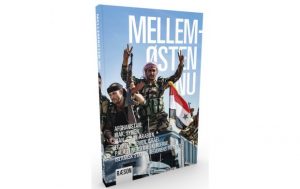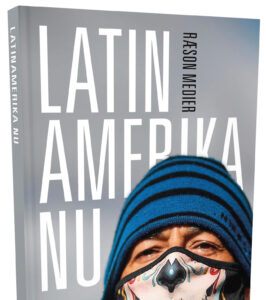24.08.2017
.„The International Atomic Energy Agency continues to certify that the Iranian Nuclear Program remains civilian. This is the assessment to the international community and has been since the January of 2016. A bunch in the White House might convince the U.S. congress otherwise and they might enable the U.S. to act unilaterally, but I don’t think that’s going to lead to international actors like the Russians, Chinese and Europeans backing up Mr. Trump on this issue‟
„Iran wants to make sure the that U.S. no longer has the ability to threaten other countries engaging with Iran economically. I would not say renegotiations are impossible, but right now it looks difficult and I don’t see any real push for it. But even if it happens, it does not necessarily mean that the U.S. is going to come out with a much better deal than it wants‟
„It does not matter for Iran in the long term whether Assad stays in the end or some of Assad’s lieutenants take over‟
Interview by Viktor Bournonville
RÆSON: 19 May 2017 Iran held the presidential elections. Reformist candidate Hassan Rouhani won re-election against Ebrahim Raisi. How does the outcome, Rouhani’s victory, help secure the survival of the nuclear deal between U.S. (UK, Russia, France, China and EU) and Iran?
It does so on a couple of different levels. Hassan Rouhani had gambled politically in being a huge supporter of the deal, arguing that this will end Iran’s political isolation on the international stage. That it would open the channels for foreign investments in Iran and thereby create better conditions for the people at home. So, he really put a lot of emphasis on all the positives that could come from the nuclear deal. But you must remember that the nuclear deal was a decision that was made before Rouhani was elected president in 2013. He benefited from the fact that his boss, Ayatollah Khamenei, the supreme leader, had already made up his mind. If Khamenei did not want a deal there would have been no nuclear deal. Rouhani’s hard-line critics would say: “He was weak and naïve’’ and that “The United States was taking advantage of him’’ and that “He had signed a deal where he wasn’t receiving the benefits because America was finding new ways of maintaining Iran under isolation’’. Put all that noise aside, the fact was that the nuclear deal and its survival was never questioned in the election in May 2017. It was never in Jeopardy.
The nuclear deal was a decision that was made before Rouhani was elected president in 2013. He benefited from the fact that his boss, Ayatollah Khamenei, the supreme leader, had already made up his mind. If Khamenei did not want a deal there would have been no nuclear deal
_______
RÆSON: Rouhani was inaugurated on 3 August. Khamenei told Rouhani as one of three major orientations: “We can have a broad relationship with the world by helping other nations and governments, benefiting from their help as well.‟
How is the relationship between the religious leader, Khamenei, and the reformist, Rouhani, going to shape the foreign policy in the future?
Rouhani is not really a genuine reformist, which is why Khamenei has so much time for him. Khamenei trusts that Rouhani will make changes only in close consultation with him. That gives Khamenei a lot of comfort. Mahmoud Ahmadinejad (president from 2005 – 2013, ed.) had started in his second term to break free from Khamenei and as soon as he did that, the military intelligence apparatus came down hard on Ahmadinejad and marginalised him. Rouhani does not want the same thing to happen to him and he is likely to operate very closely with Khamenei. Don’t expect any major surprises on foreign policy or even domestic policy from Rouhani. What you can hope for if you are an Iranian reformist, at best, is that Rouhani has the capacity to convince Khamenei to perhaps make certain concessions on certain policy issues. And do not forget that in this Iranian setup, you have got other interest groups that are worried about what Rouhani is going to do. Particularly, The Islamic Revolution Guard Corps are very concerned about Rouhani’s potential agenda and his ability to convince Khamenei to side with him. They are doing everything they can to slow down reform if that proves to be where Rouhani wants to go. It could be reform on the domestic, regional or international front.
What you can hope for if you are an Iranian reformist, at best, is that Rouhani has the capacity to convince Khamenei to perhaps make certain concessions on certain policy issues
_______
RÆSON: Earlier this year, Iran was testing their ballistic missile program. On 27 July, Iran has expanded its missile capabilities in having successfully launched a missile with the potential of delivering satellites into orbit. The US claims this is a breach of the UN Security Council resolutions and has responded with sanctions. Rouhani has sworn to retaliate on any sanctions, but hasn’t done so yet. What are his options responding to the sanctions?
He does not have much of an option, except carrying on testing these missiles and hope that the United States can’t get the rest of the international community to come to its side on the issue on whether these missiles are under violation of the UN Security Council resolutions or not. There is no agreement on this issue as of now. Certainly, the Chinese and the Russians do not agree on the U.S. position and as long as they have veto powers in the Security Council, there is not much the U.S. can do on an international level. What the U.S. can do is unilateral American action against the Iranians. If the U.S. acts unilaterally, the Iranians have learned to live with American sanctions in the past. What Iran fears are international sanctions. Frederica Mogherini [High Representative of the EU Foreign Affairs and Security Policy, ed.] sitting at the inauguration of Rouhani after the missile tests was symbolically a very important message. Now, Europe changes its path from the Trump administration. The EU wants to have a critical dialogue with the Iranians.
Lately, Iran and Rouhani have been proclaiming that it would easily back down on the current nuclear deal if the U.S. impose more sanctions than already in place.
Certainly, the Chinese and the Russians do not agree on the U.S. position and as long as they have veto powers in the Security Council, there is not much the U.S. can do on an international level
_______
RÆSON: Iran’s foreign minister Mohammad Javad Zarif said to Iran Primer on 19 July that it will lead to no outcome, if Iran and U.S. try to renegotiate to get a new and better that the Trump administration is pushing for. What are the chances of a renegotiation do you think?
I think a lot of people say that this is impossible because Iran is not going to agree to that. I think the Iranians might be willing to agree. The problem for the Trump administration is that Trump wants more concessions from the Iranians, but the Iranians are not going to come back to the negotiations just to provide more concessions. They, too, want something more. Iran wants to make sure the that U.S. no longer has the ability to threaten other countries engaging with Iran economically. I would not say renegotiations are impossible, but right now it looks difficult and I don’t see any real push for it. But even if it happens, it does not necessarily mean that the U.S. is going to come out with a much better deal than it wants. For instance, I don’t see the Iranians giving up their ballistic missile program – one that also lead to sanctions from U.S. – as part of any future negotiations. So, the question really is, what’s the point of more negotiations if the U.S. can’t impose its will but must engage in a two-way dialogue with the Iranians? Politically, that’s going to be very messy and what President Trump wants is an easy win. He made a promise to kill this Iran-deal and wants to say: “I did”. He is not going to get that as we are now and that is why it will probably be best for him to not even try.
RÆSON: But will Trump be able to live with the deal as it stands now?
His alternative is war. That is not much of an alternative, because domestically there is no desire for another U.S. war in the Middle East. Certainly not with a country as big as Iran. His alternative to war is to get the international community to go back to reimpose sanctions and there is no sign that the international community believes that the U.S. warnings about the Iranian Nuclear Program are accurate. The International Atomic Energy Agency continues to certify that the Iranian Nuclear Program remains civilian. This is the assessment to the international community and has been since the January of 2016. A bunch in the White House might convince the U.S. congress otherwise and they might enable the U.S. to act unilaterally, but I don’t think that’s going to lead to international actors like the Russians, Chinese and Europeans backing up Mr. Trump on this issue. Frankly, I think President Trump has not done himself any service by being so aggressive on the international stage or so chaotic in terms of what he wants – in other words, he doesn’t have much political capital to tap into to get to the world and say to them: “Come behind me on the issue on Iran.”
[Trump’s] alternative is war. That is not much of an alternative, because domestically there is no desire for another U.S. war in the Middle East. Certainly not with a country as big as Iran
_______
RÆSON: Talking about Trump wanting to influence Europeans to stand down on Iran. There have been several sources saying that he tried to do so in May leading up to the G20, trying to convince the Europeans to reject on making trade deals with Iran. What really happened?
That happened at the G20-summit in Hamburg and has been verified by Mohammed Javad Zarif and others. The Europeans are clearly not listening. Total (a French multinational integrated oil and gas company, ed.) signed a $5bn. deal with Iran over gas fields. Renault (a French automobile manufacturer) signed a $800 million deal. The Germans are handling it well. The Italians are buying Iranian oil. The Spanish are back, the Greek are back, even the Swedes and the Danes are back. The European countries are looking to Iran as a place that you could potentially make money. And when you look at the G20-summit in Hamburg, President Trump said to these leaders: “Don’t deal with Iran”.
But the reality was that 18 of the 20 countries were already either engaging in Iran and had already started implementing economic deals or were negotiating with the Iranians. Only the United States and Saudi Arabia of the G20 countries are not economically involved in Iran. Now, that just tells you the distance between what Trump is saying on Iran and what the rest of the world sees in Iran.
The European countries are looking to Iran as a place that you could potentially make money
_______
Iranian policy in the region is troubling. But to fight Iran’s agenda in Syria and Iraq and the region is one thing, to undo a nuclear deal, without having an alternative that is better in place first, is different. And that is one of the things the world is also paying attention to. If you are in Paris, London and Berlin or Tokyo, you see a Trump administration that doesn’t really have a strategy on Iran. The U.S. State Department still believes this nuclear deal is a good deal and the Pentagon does not want war with Iran. You have a bunch of people sitting in the White House, not necessarily the best experts on Iran or the Middle East for that matter, who want to do something politically because the President made a promise during his election campaign. But if you go to war with Iran right now, which is a real possibility, the consequence is Iraq 2.0. Hundreds of billions of dollars wasted. The question then is: “Is that the best way to confront Iran?”
RÆSON: Iran have struck a new agreement with Iraq to improve cooperative efforts against terrorism and jihadism. A deal not well received in Washington D.C. Considering President Trumps longstanding attacks, accusing Iran of propping up terrorism in the region and the fact that Iran will get further influence in the region, will this deal create further tension between Iraq, Iran and the US?
The Iranians are heavily involved in Iraq’s politics, security and you name it. The United States should encourage Iraqi Shia and Sunni Muslims and Iraqi Kurds to have a better ability to co-exist as Iraqis within Iraq. And once the U.S. can do that, and hopefully the Iraqis will listen to the advice, then the ability of Iran and other regional actors to penetrate and influence Iraqi politics will diminish. What do you do in the long term to make Iraq a functioning, multi-ethnic, multi-confessional society, that is secular, where you don’t have a religious authoritarian leadership on top that looks like or to Iran for inspiration? How do you get to that point? It’s very difficult, but that ought to be the policy, instead of saying: “Don’t let Iranians into Iraq” because that is just wishful thinking. You cannot get the Iranians out of Iraq unless the Iraqis themselves realize that they will be better off with lesser influence from Iran. There are many joint deals between Iraq and Iran, they go back to 2005. This is not a new phenomenon and Iran influences Iraq under the surface a lot more than a joint deal and announcement will tell you. You could say that the Iranians are so powerful that they are a key voice in who becomes the next prime minister. That is their level of influence. And agreement on arms sales is almost a marginal issue, it’s not a big factor. Iran can sell whatever they want to Iraq. They are in many ways, as far as foreign power concerns, the kingmakers in Bagdad.
the Iranians are so powerful that they are a key voice in who becomes the next prime minister
_______
RÆSON: Is the deal an Iraqi assertion of its misalignment with U.S. interests?
I don’t think Iraqis would want to walk away from the United States. Certainly, if they did that, it would be a strategic blunder on their part. Then they will be under the control of Iranians more so, and that is not in the interests of Iraq or any other foreign country. The United States has been dedicated to Iraq for a very long time, providing both blood and treasure for Iraq’s security. Has the United Stated made mistakes? Of course, but it is there right on the ground helping the Iraqis withstand ISIS.
RÆSON: Will the deep Iranian influence help that secular movement?
No, it must be forced out. The Iranian influence in Iraq is basically the worst kind of Iranian influence that you can expect. Iran has different faces. There is the face of secular Iranian opposition, which is very interesting, it’s a face that is almost cosmopolitan at times. It’s the face of the future, it could be a force for good, but that’s not the face of Iran operating in Iraq. That is the face of the Revolutionary Guards Corps, which is ideological anti-U.S., anti-West, anti-secularism. If they prevail in Iraq and further consolidate their power, the cause for secular, democratic projects in Iraq will be set back. But how do you push this deep Iranian influence in Iraq out? You have to tell the Iraqi-Shias, who are concerned about their well-being, when they are confronted with something like ISIS: “You will be able to defend yourselves and we will be there to support you both in terms of security but also economically”. In other words, you must prevent Iraqi-Shias from being forced into the arms of the Revolutionary guards and rely on their ideological anti-U.S., anti-West, anti-secularism message. If you keep them from doing so, you have already started winning the battle.
RÆSON: The Astana talks wherein Turkey, Russia and Iran have been aiming for a consensus on four de-escalation zones in Syria as the first steps in settling the Syrian civil war have proven unsuccessful, officials citing Turkey’s reluctance to commit to any mechanisms as the reason. What needs to happen before the next meeting in late August for Turkey to change its mind and this coalition to get to an agreement?
You have so many different moving parts. One of them the Syrian groups: What do they want? What do the U.S. want? The U.S. has had conflicting positions on the question of its support for the Syrian Opposition and have often been changing its mind. Turkey is trying to balance its interests. The bottom line Turkish position is no independent Kurdistan, which they share with the Iranians. So, they have something in common with the Iranians, and yet on the question of Assad’s future, that’s where the Turks, Syrians and Iranians will seek alignment of positions. What happens to Syria? Do we keep it as one country? Do we split it up? That remains to be seen.
RÆSON: Saying that the fight against ISIS as a quasi-state is now more or less won and people are looking to the conflict in Syria and the question of who is going to take control of the region – both in Syria and the areas around Mosul in Northern Iraq. In the balance between Russia, the Kurds, Iraq, where does Iran stand, strategically, on this question?
For the Iranians, it is a lot easier to define what a loss would look like in Syria than a win. I don’t think they know what a win would look like. But a loss would look like Saudi Arabia basically having a group in support take over Damascus, killing Assad, removing his regime and taking over. That would be a very clear Iranian loss in Syria, but the fact is we are not even close to that, if anything we are at the opposite end of the spectrum. Assad will most likely stay, the Saudis and the Gulf Cooperation Council have lost interest and are busy in Yemen. The Russians and Iranians, despite their tensions and rivalries, have proven to have very solid backing for Assad and nobody has been able to dislodge that. The Russians and Iranians have won the war for Assad on the ground. Once ISIS is finally defeated, the hard-heavy lifting starts. Can the Iranians and Russians still agree? We hear rumours that the Iranians and Russians have disagreement on what the future of Syria should look like. Should it be a secular Syria or should it look more like Iran? These are going to be serious differences. But we haven’t reached this point yet. Because first they want Assad staying in power. And the question for the Turks is: Can they be a part of that conversation with the Russians and Iranians? I think they can. There is a real desire from the Russians and Iranians for to Turkey to join. That does not mean that Turkey gets to decide what is going to happen in Syria, but they will get a say. And I think that’s better for Turkey than being excluded.
I don’t think [the Iranians] know what a win would look like. But a loss would look like Saudi Arabia basically having a group in support take over Damascus, killing Assad, removing his regime and taking over
_______
RÆSON: So, hypothetically when we get to this conversation, what would be the Iranians end-game or goal in this?
Maximum amount of influence in Damascus. It does not matter for Iran in the long term whether Assad stays in the end or some of Assad’s lieutenants take over. Iran is not dedicated to the man Assad or the family. Iran is dedicated to preserving maximum influence in a strategic country as Syria. Which is the bottom-line.
RÆSON: About the influence and presence in Syria, we have seen Iranian proxies fight in the southern part of Syria. How has the movement of Iranian military and Hezbollah influenced the scope of Iran’s foreign policy on an international level?
I don’t know why Hezbollah and the Iranian Military is so keen in getting close to the Golan Heights and the Syrian border to Israel, when their goal right now is to keep Assad alive and fight ISIS. But it has forced the Israelis to get more involved. And the rhetoric and presence of Iranian proxies does not help them, when it has an ability to mobilize Israel and Israeli-friends against Iran. On an international stage Iran will look like a risky investment, when they might get itself into another war in the region by operating in Southern Syria close to Israeli borders. It creates doubt and the Iranians can’t afford that. They need to ensure the confidence of the international community and the image that Iran is a good place to invest. To keep this image alive, they should not engage in these sorts of projects where they seem to be expanding using malicious and militant power. That gives all the wrong image of Iran.
Alex Vatanka is a senior researcher at the Middle East Institute who specializes in the Middle East and regional security with a focus on Iran. He is currently working on the book: “The Making of Iranian Foreign Policy: Contested Ideology, Personal Rivalries and the Domestic Struggle to Define Iran’s Place in the World.”
ILLUSTRATION: Recently reelected president Hassan Rouhani holds a speech as his cabinet is approved by the Iranian parlament, Tehran, Iran, 20 August 2017 [photo: Fatemeh Bahrami/Anadolu Agency/Polfoto]




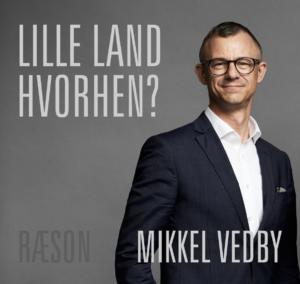


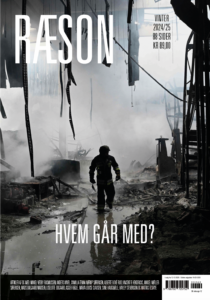
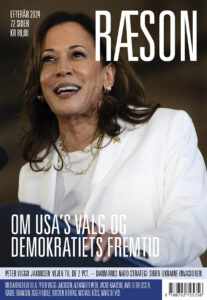
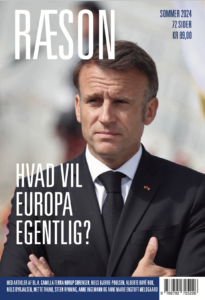
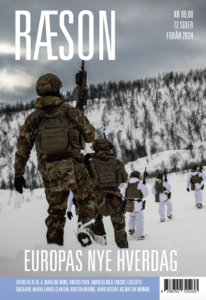
![Kampen om magten: „En meget berigende politisk bog […] Anbefales til indkøb‟](https://d.raeson.dk/wp-content/uploads/2020/02/usa.trump_-300x274.jpg)
